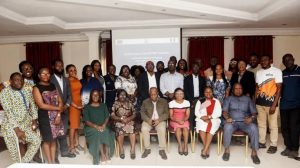The Department of Climate Change (DCC) of the Federal Ministry of Environment has tasked journalists on raising awareness on climate change issues in the country.

The Director of DCC, Dr Iniobong Abiola-Awe, gave the charge at the end of a three-day workshop for media professionals on climate change on Wednesday, June 26, 2024, in Lagos.
Abiola-Awe was represented by Mrs Dolapo John-Akhighbe, the Desk Officer at Department of Climate Change.
The workshop, held under the auspices of the DCC and the Nigeria Climate Change Response Programme (NCCRP), was organised to equip journalists for adequate reporting of climate change issues.
The European Union funded NCCRP intends to enhance Nigeria’s capacity to meet its Nationally Determined Contributions (NDC) pledge of 47 per cent reduction in greenhouse gases emissions by 2030 in line with the Sustainable Development Goal 13.
Abiola-Awe, who commended the participants for their active participation at the workshop, called for increased awareness on climate change effects.
“As we end this capacity building workshop for media professionals on climate change, I would like to extend my gratitude for your active participation and dedication over the past few days.
“The knowledge and skills you have gained here will undoubtedly significantly impact your reporting of one of the most critical issues of recent times i.e. climate change.
“Climate change is a global challenge that requires unified actions and as media professionals you hold the unique power to inform an inspire change.
“Your role in raising awareness, holding stakeholders accountable and shaping the public opinion is crucial in driving the necessary action toward a more sustainable and resilient future,” Abiola-Awe said.
She also stressed the importance of fact checking in climate change reportage
“I encourage you to continue learning and evolving in your coverage of climate change.
“To seek out diverse perspectives, to fact check vigorously and to communicate climate solution-oriented stories that empowers individuals, communities, state and the national to take positive climate actions.
“Remember the power of storytelling is immense and your words and pictures have the potential to inspire change, foster understanding and driven progress of climate action,” she said.
The NCCRP Team lead, Dr Todd Ngara, encouraged networking among the journalists in creating awareness on climate change issues.
“A lot of themes were discussed in the course of the workshop as regards climate change.
“However, our focus as the NCCRP is to actualise a network of journalists on climate change report, hence the introduction of participants to Nigerian Journalists for Climate Change Action Network (NIJOCAN).
“This workshop is the third gathering of journalists on climate change, and in the first workshop in Abuja, NIJOCAN was created, and the second in Keffi.
“To include the southern journalists hence the workshop in Lagos to include journalists from the region.
“For sustainability and inclusivity, we urge journalists from the South to be part of this network to push the frontiers of climate change reportage in the country,” Ngara said.
On his part, Mr Michael Simire, a facilitator at the workshop, commended the journalists for their active participation.
“The training has been successful so, indeed climate change communication is very important.
“We have observed that the journalists have been very active and participatory in all the workshop sessions. They are enthusiastic and are learning, which is very commendable.
“This will mean that the workshop will impact positively on their reportage of climate change issues.
“This will foster better communication of climate change issues and the public will become aware of intricacies and the dynamics of climate change impacts.
“Then they will be able to make necessary changes in their relationship with the environment,” Simire said.
A key expert in communication and capacity building with the NCCRP, Ms Elizabeth Mwaniki, called for increased coverage of climate change issues by the journalists.
“This workshop targets adequate reportage of climate change issues in media newsrooms in Nigeria.
“Through the workshop, we learnt the importance of putting climate change reports on the front pages of our media reports.
“Going forward, we expect that after this training, that journalists will go give climate change stories more visibility and expand their coverage of climate change issues.
“We also hope to build more networks among climate change reporters to ensure sustainability of the reportage,” Mwaniki said.
By Mercy Omoike
